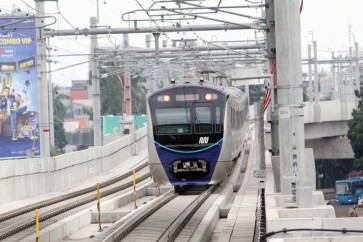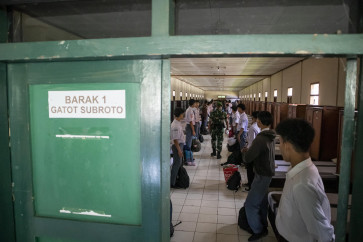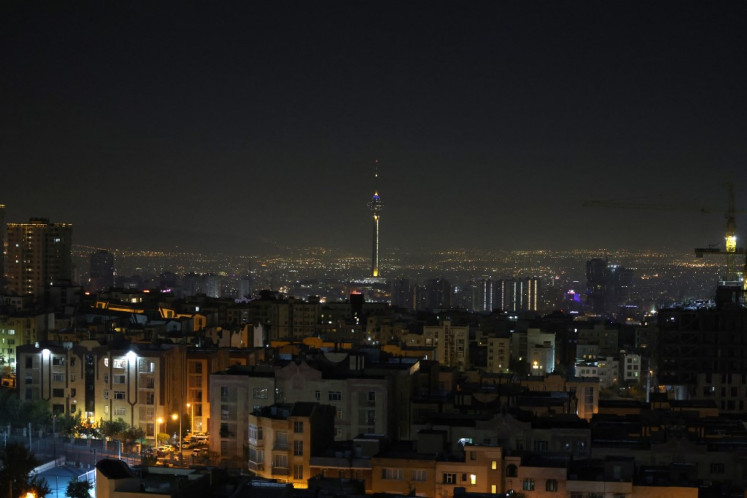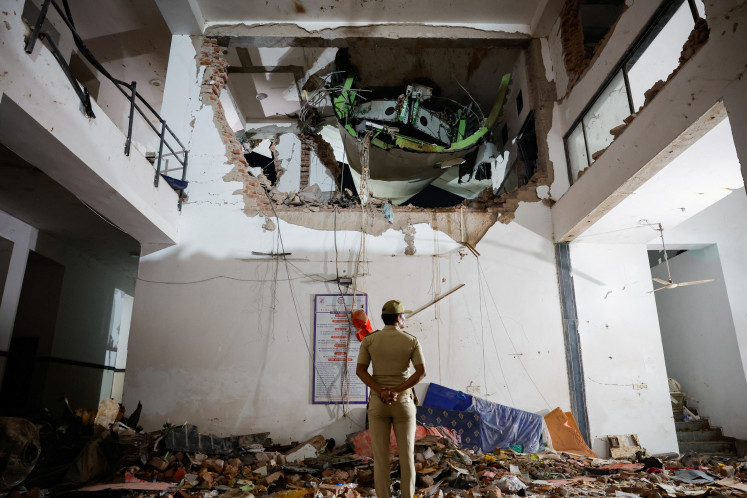Doubts remain as military reserves provision enters into force
Change text size
Gift Premium Articles
to Anyone
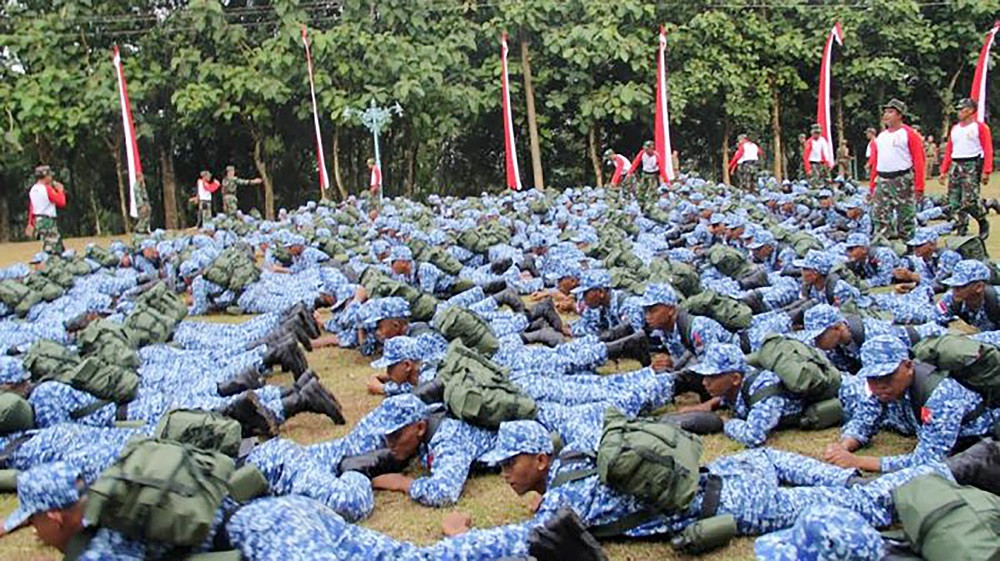
P
resident Joko “Jokowi” Widodo recently signed a regulation allowing civilians to enlist as military reservists in a bid to strengthen the country’s defense system and deal with emerging national threats.
Government Regulation (PP) No. 3/2021 was issued on Jan. 12 as an implementing regulation for the 2019 law on the management of national resources for state defense, covering the formation of the new defense scheme, the admission process and the education program.
Young people aged 18 to 35 are the main target for the military reserves program, which is to be managed by the Defense Ministry.
According to Article 1(9) of the regulation, reservists are a national resource that can be mobilized to increase and to strengthen the Indonesian Military (TNI) as the country’s main military component.
The 2019 law stipulates that reservists can be mobilized in instances where the country faces military, nonmilitary and hybrid threats including separatism, communism, terrorism, aggression, natural disasters and chemical and biological attacks, among other issues.
Read also: National defense program for civilians not 'militarization', says deputy minister
Not compulsory conscription
However, the Defense Ministry insists that the program is not the same as compulsory conscription. Reservists are civilians who fit the requirements to be trained militarily and they will only be subjected to military law during mobilization, as explained on the ministry’s official website.
The ministry also argues that the country is in urgent need of establishing a “total people’s defense” system, which combines militia forces with civilians in a bid to protect the nation from more advanced future threats.
Dahnil Anzar Simanjuntak, spokesperson for Defense Minister Prabowo Subianto, said that the recruitment of 25,000 reservists was expected to be concluded this year.
“We are currently drafting the ministerial regulation. After that, we will proceed with the [outreach] program, open recruitment, selection, training and appointment,” he said.
The issuance of the ministerial regulation will further complete the technical requirements and mechanisms for recruitment, selection and training.
Candidates undergoing the selection process are expected to pledge loyalty to the nation and state ideology Pancasila, in addition to passing physical and psychological tests.
The program covers a three-month training period that includes modules from the Bela Negara (state defense) program and basic military education to increase participants’ sense of nationalism and patriotism.
Read also: Military reserve looks to millennials despite criticisms
Mixed responses
Arnold Kristian Putra, 22, is fascinated by the idea of serving the nation, because of his love for the country. He has always had an itch to serve in the military and “become useful” for the nation.
Enlisting as a reservist is important, he said, because the global threats of today are targeting the youth and for him it is scary.
“I think that as a part of the millennial generation, I’d want to understand the national defense system, and it’s just as important for me to know how I can help defend the unity of Indonesia,” the young entrepreneur told The Jakarta Post this week.
Based on his experience as a former member of the 2014 national flag-hoisting team, basic military training has not only taught him about command drills, but also how to fulfil one’s responsibility, how to be disciplined and become an honest leader with integrity, and how to be a perfect role model for other young people in the country.
While he failed to make the cut for military enlistment in 2016, Arnold was willing to try again through the reservist program. He is currently with the State Defense Candidates Forum (FKBN) – a group of volunteers undergoing the Bela Negara program.
“For me, it’s more than just defending the country; it is also about actively participating in maintaining national stability,” he said.
Unlike Arnold, 25-year-old Irvandias Sanjaya said the idea of joining as a reservist was unappealing.
“The civilian militia reservists might be used to support the government’s agenda in homogenizing attitudes, perspectives and other practices in society,” he said.
Irvandias said that the nationalist and patriotic jargon thrown about in relation to the reserves program was just part of a state-led narrative that no longer works on urban millennials who are more versed in politics.
“Even so, I believe that many young people might still be interested in joining the military reserves program due to financial reasons, [...] considering the vulnerability of people living in poverty,” the freelance worker said.
Similarly, NGO worker I Gusti Khrisna, 26, is not at all interested in joining up as a reservist. He said he did not see any urgency to enact the program, and suggested instead that the government could give TNI personnel more training instead of recruiting civilians.
However, Krishna believes there is merit in having a good state defense program that provides various kinds of training for people in order to serve in the nation’s interest.
“I guess it should not only be about military-based programs. It can also focus, for instance, on food security or health crisis [training] – things that can become more threatening in the future,” he said recently.
Read also: Military reservists and force consolidation vs. reality check
A cheaper alternative?
Expert arguments for and against the military reserves program are just as varied.
Andrea Abdul Rahman, a defense management expert from Budi Luhur University, said that military reservists were needed to complement the number of people serving in the military, which, at around 800,000 personnel, still falls short of the requirements for a “minimum essential force”.
“It won’t be sufficient for military operations other than war, for example in the case of natural disasters, human-made disasters, health assistance, etc.,” Andrea said this week.
Increasing the number of TNI personnel also might not be a favorable option, he noted, as it would put more strain on the state budget allocation for defense, including for recruitment, training, deployment, wages and allowances.
The military reserves program, in contrast, only uses around 1 percent of the total national defense budget by doing away with remuneration, the ministry says.
“Training civilians for the sake of homeland security [...] is important as it ensures public security and order,” Andrea said.
In contrast, rights activists have decried the program for its potential for civilian militarization and rights violations.
Activists also fear a possible return of paramilitary forces under the Pamswakarsa (private security) doctrine, which was mostly used by the New Order regime for repression and to stifle criticism from opposition, protestors and other critics of the government.
Imparsial executive director Al Araf said the military reserves regulation violated the right to conscientious objection to military service, in which an individual can refuse military service.
He cited Article 77 of the 2019 law that stipulates that reservists who intentionally avoid a call to be mobilized will be subject to a maximum of four years’ imprisonment.
“State defense and nationalism can also be defined in broader terms that include encouraging society to fight corruption and reject any form of violence or upholding law and order,” he suggested.


